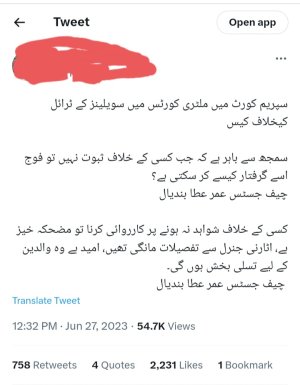EU concerned at May 9 convictions by military courts
The European Union (EU) on Sunday expressed concerns over the conviction of 25 civilians after being found guilty of attacking army installations by the military court, insisting the verdict was inconsistent with Pakistan's commitments to ensure a 'fair and public' trial of every person.
"The European Union notes with concern the sentencing of twenty-five civilians by a military court on 21 December in Pakistan," read a statement issued by the European External Action Service (EEAS) in Brussels.
The EU reaction came after military courts sentenced 25 civilians to prison terms ranging from two to 10 years for attacking military installations during riots which erupted following the arrest of former prime minister Imran Khan in May last year.
In a detailed statement, the military said that the nation on May 9 witnessed tragic incidents of "politically provoked violence and arson at multiple places, marking a dark chapter in the history of Pakistan" when, building on a sustained narrative of hate and lies, politically orchestrated attacks were carried out on the army installations and monuments of martyrs.
"These blatant acts of violence not only shocked the nation but also underscored the necessity of checking this unacceptable attempt of political terrorism to impose own perverted will through violence and coercion," it stated.
According to the statement, a field general court martial sentenced 25 individuals in the first phase, following a thorough review of evidence and the completion of proper legal procedures.
However, the EU voiced concerns over the military court verdicts.
"These verdicts are seen as inconsistent with the obligations that Pakistan has undertaken under the International Covenant on Civil and Political Rights (ICCPR)," the statement added.
"In line with article 14 of ICCPR, every person is entitled to a fair and public trial in a court that is independent, impartial and competent, and has the right to adequate and effective legal representation. It also stipulates that any judgement rendered in a criminal case shall be made public," the statement further said.
It also pointed out that under the EU's generalised scheme of preferences plus (GSP+), beneficiary countries, including Pakistan, have voluntarily agreed to implement effectively 27 international core conventions - including the ICCPR - in order to continue benefitting from GSP+ status.
The GSP+ provides wide-ranging tariff preferences for imports to the EU from vulnerable developing countries to support poverty eradication, sustainable development and their participation in the global economy as well as reinforce good governance.
Eligible countries like Pakistan can export goods to the EU market at zero duties for 66% of tariff lines.
This preferential status is conditional on GSP+ countries demonstrating tangible progress on the implementation of 27 international conventions on human and labour rights, environmental protection, climate change and good governance.
GSP+ has been very beneficial for Pakistani business increasing their exports to the EU market by 65% since the country joined GSP+ in 2014.
With over 440 million consumers, the European single market is Pakistan's most important destination. Pakistan exports worth 5.4 billion (approximately Rs1.2 trillion), namely garments, bedlinen, terry towels, hosiery, leather, sports and surgical goods.
Meanwhile, the legal community has raised concerns over the implications of Pakistan's non-compliance with international legal obligations, particularly regarding the military courts' decisions to sentence civilians.
Former additional attorney general Tariq Mahmood Khokhar asserted that the rule of law, a constitutional principle globally and in Pakistan, mandates state compliance with both national and international laws.
Khokhar highlighted that Pakistan is a signatory to the ICCPR, whose Article 14 guarantees the right to a "fair and public hearing by a competent, independent and impartial tribunal".
"Article 10A of our constitution guarantees a fundamental right to a fair trial. The International Commission of Jurists is of a consistent view that Article 14 prohibits the trial of civilians in military courts. Our national jurisprudence also prohibits the trial of civilians in military courts," he noted.
Khokhar further stated that the December 21 convictions and sentences of 25 civilians by military courts breach Pakistan's obligations under international and national law. "The consequential ramifications will be dire, both domestically and internationally," he warned.
He elaborated on the potential economic fallout, stating, "Failure to comply with Article 14 and the lack of good governance (read lack of democracy, rule of law, independent judiciary, free press, human rights, etc.) constitutes valid grounds for suspension of Pakistan's GSP+ status. That would mean a ban on exports to our biggest trading partner".
"Our unrepresentative federal and provincial governments and legislatures, dysfunctional institutions and law enforcement agencies, controlled judiciary, and muffled media outlets already lack public legitimacy. The December 21 decision(s) will usher in further doom and gloom."
Faisal Siddiqi, who represented civil society members in the military courts case, described the convictions as a "tragic reminder of the dark days of the usurper and former military dictator General Ziaul Haq".
"These sentences of 10 years are especially shocking as they violate the undertaking and assurance given by the Attorney General of Pakistan before the Supreme Court that no longer sentences would be awarded, as recorded in the order dated 27.06.2023, and the detailed judgment dated 23.10.2023," Siddiqi pointed out.
"Such a violation of an undertaking comes within the ambit of contempt of court," he added.
EU concerned at May 9 convictions by military courts

tribune.com.pk




















